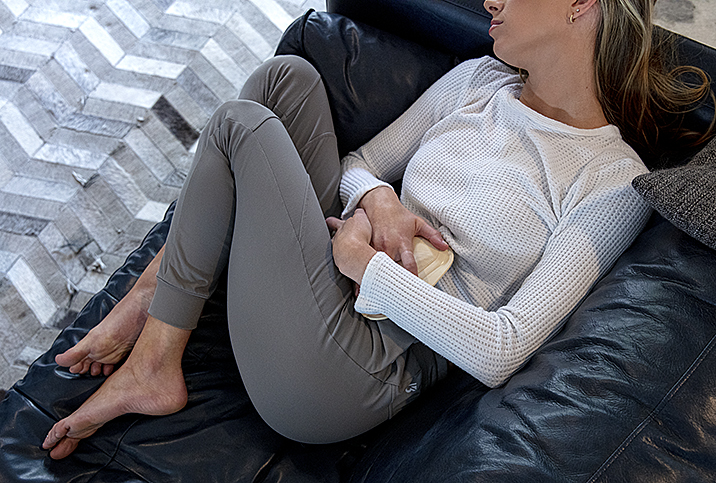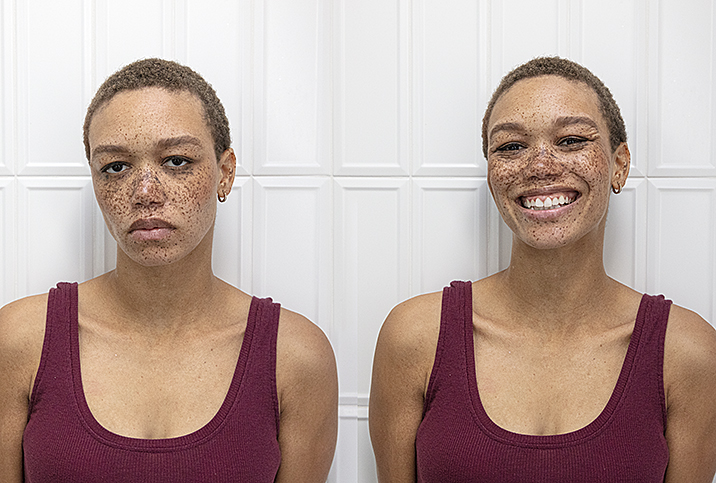Is This PMS or Am I Pregnant?

In terms of physiological processes, pregnancy and premenstrual syndrome (PMS) could not be more different—one alerts you if an egg or zygote has been fertilized, while the other indicates your unfertilized egg is about to be released. Despite their differences, many people confuse early pregnancy symptoms with those commonly associated with PMS.
Hormonal causes
One reason the signs of these conditions are similar is because of hormone production. Progesterone, for example, is a reproductive hormone whose levels increase both during early pregnancy and the time right before your period. Because both things cause a spike in production, their subsequent physical manifestations show a lot of commonalities.
So how can I tell the difference?
The quickest and easiest way to tell the difference is to take a pregnancy test either at home or at a doctor's office. Some modern urine tests can detect pregnancy as early as four days before a missed period.
Arguably, the most important distinction between pregnancy and PMS symptoms is about persistence. If your period is the cause, the symptoms will go away during or after menstruation. Whereas, if you're pregnant, you will continue to experience physical changes and sensations.
Even still, there are some indicators that are unique to pregnancy.
Mood swings
Abrupt emotional changes are a hallmark trait of both PMS and pregnancy. Shifts in estrogen have been shown to lead to other hormonal imbalances, which directly impact mood regulation. While this effect usually disappears when you get your period, it often continues throughout pregnancy. If the cause is not pregnancy, and the symptoms are continuously intense, it's possible you might suffer from premenstrual dysphoric disorder.
Fatigue
There are many reasons why both pregnant women and those who have PMS experience tiredness. In the human body, iron lies within the blood. Its levels decrease during a period because of blood loss, and deficiencies can cause a lack of energy.
Progesterone, a hormone that plays a pivotal role in the reproductive system, also brings about fatigue. An influx of progesterone occurs during both PMS and pregnancy, so both conditions can leave you feeling wiped out.
Hormonal exhaustion notwithstanding, growing a human being is tiring work and puts a lot of strain on the body. This is another reason why pregnant women often report having severely diminished energy levels.
Dietary changes
The intense cravings associated with PMS and pregnancy are well known. Women—pregnant or not—often have the urge to consume specific foods and experience an increase in appetite.
However, one observed difference is the addition of food aversions with pregnant women. Sometimes even the sight or smell of a particular food item can bring about a wave of sickness, but this occurs much less frequently with PMS.
Another notable trend amongst those who are pregnant is the craving for unorthodox foods on an irregular schedule. For example, one woman could decide to exist solely on ice cream, while another has bizarre and irresistible cravings in the middle of the night.
In rare cases, these cravings are for unexpected things. Pica occurs when someone has the urge to consume nonfood items or those with virtually no nutritional value. Some of the most common cravings include clay, soap, dirt, chalk and ice, though there is no limit to potential urges.
While a pregnant woman crunching on ice isn't harmful, eating products containing toxins or other harmful substances can be. It is surmised that pica occurs due to nutritional deficiencies, particularly iron. If you are pregnant and find yourself wanting nonfood items, consult your obstetrician to prevent further blocked nutrient absorption and damage to yourself and the baby.
Sickness
Gastrointestinal upset, including cramps, queasiness and general discomfort, can occur with PMS and pregnancy. However, women with PMS usually do not experience severe nausea and become physically ill to the point of vomiting.
While this pregnancy symptom has been coined "morning sickness," it can actually occur at any time of day. It is thought to be caused by increased levels of a pregnancy hormone called human chorionic gonadotropin (hCG). This hormone is not present during PMS.
Breast changes
Women have frequently reported increased mammary sensitivity, tenderness, swelling and general discomfort during both pregnancy and PMS. However, the majority of breast complications occur when you're pregnant.
Another major difference is that women who are pregnant can also experience nipple changes. The areola, which is the skin surrounding the nipple, becomes darker and engorged. Along with that, the breast itself shows a marked size increase that is atypical of PMS.
Frequent urination
This is one symptom that is exclusively applied to pregnant women. Being pregnant puts extra strain on your bladder, which can increase frequency. Additionally, the proximity of an expanding uterus to the bladder increases chances of incontinence.
At the root cause, pregnant women pee more because of kidney hyperactivity. The kidneys act as waste filters for your blood, and because a fetus increases waste production, the urge to urinate grows. These processes do not occur during PMS.
If you're concerned you may be pregnant, there is only one way to know for sure: a pregnancy test. At-home tests are incredibly accurate, but a doctor's appointment may ease your worries. If you are experiencing extreme PMS symptoms, a gynecologist can help determine why and come up with an effective treatment plan.
















